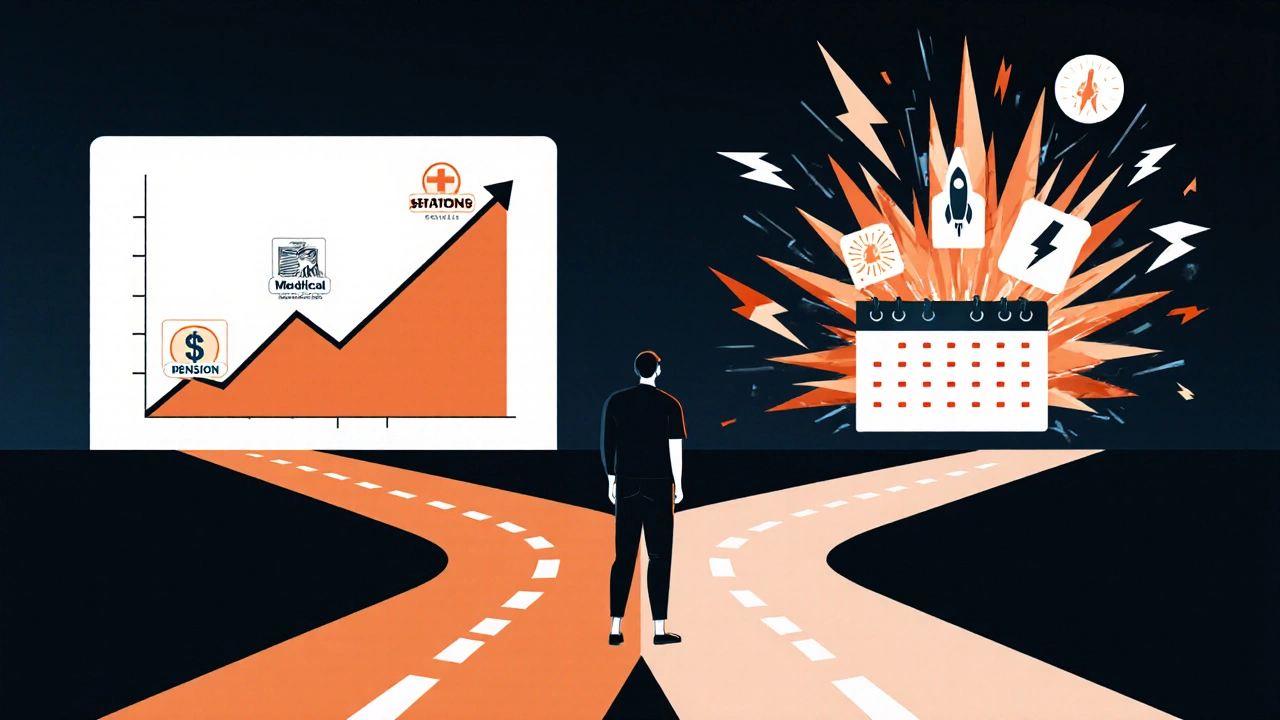Government vs Private Job Calculator
Personal Information
Government Job Details
Private Sector Job Details
Career Comparison Results
Key Insight
This tool helps you compare financial prospects and growth potential between government and private sector jobs over time. Your results will appear here after calculation.
| Category | Government Job | Private Sector |
|---|---|---|
| Current Annual Salary | ₹0 | ₹0 |
| Projected Annual Salary (in 10 years) | ₹0 | ₹0 |
| Projected Total Earnings (in 10 years) | ₹0 | ₹0 |
| Job Security | High | Medium |
| Work-Life Balance | Good | Variable |
| Long-Term Growth Potential | Limited | High |
| Benefits (Pension, Health) | Comprehensive | Variable |
Every year, thousands of Indians clear the UPSC, SSC, state PSCs, and other government exams-not because they dream of bureaucracy, but because they’re told it’s the only safe path. But what if safety comes at a cost? By 2025, the idea of a government job as the ultimate career win is starting to crack. It’s not broken, but it’s no longer the automatic answer it used to be.
What You Get: Stability That Doesn’t Move
Let’s start with the obvious: government job means job security. You won’t get laid off because the economy dips. You won’t be replaced by AI. You won’t get a termination notice after five years of hard work. That’s real. In a country where 80% of the workforce is in informal jobs with no PF, no health insurance, and no paid leaves, this isn’t luxury-it’s survival.
Think about it: if you’re in a central government post, you get pension after 20 years. Medical coverage for your entire family. 30 days of paid leave a year. Earned leave that rolls over. A fixed pay scale that ticks up every year, even if you do nothing extra. That’s not a perk. That’s a safety net most private sector workers can only dream of.
What You Don’t Get: Growth That Moves Fast
But here’s the catch: promotion isn’t earned. It’s timed. In most departments, you move up based on seniority, not performance. If you’re top of your batch in your first year, you’ll still wait five years for your next promotion. If you’re average? You’ll wait six. And if you’re in a non-gazetted post? You might never reach a salary above ₹15 lakh per year, even after 30 years.
Compare that to the private sector. A software engineer at a startup can go from ₹6 lakh to ₹25 lakh in five years. A sales manager in FMCG can hit ₹20 lakh by 30. In government, your salary plateaus early. The 7th Pay Commission gave everyone a raise-but it didn’t change the structure. The top rung is still capped. There’s no equity. No stock options. No upside.
The Work: Predictable, But Boring
Government work is routine. You show up at 9:30. You sign files. You attend meetings. You wait for approvals. You file reports. You do the same thing day after day. There’s little room for innovation. If you suggest a new way to do things, you’ll be told, “This is how it’s always been done.”
Some people thrive in that rhythm. They like knowing what to expect. They value peace over pressure. But if you’re the kind of person who gets restless without challenges-if you want to build something, solve complex problems, or see your ideas turn into results-government work will feel like walking in place.

Work-Life Balance? Yes, But With a Catch
Yes, you get 30 days of leave. Yes, you’re usually off by 5:30 PM. Yes, you can take a 10-day vacation without asking for permission. That’s rare in private companies where “work from home” means “work 24/7.”
But here’s what no one tells you: your work doesn’t end when you leave the office. If you’re in a field like revenue, education, or police, you’re expected to be available for emergencies. You get called at midnight for a land dispute. You’re asked to handle protests on weekends. You’re the one who has to fix things when the system breaks. Your work-life balance looks good on paper-but in practice, it’s just different stress.
The Hidden Costs: Social Pressure and Stagnation
Staying in a government job isn’t just a career choice. It’s a social identity. Your family expects it. Your friends assume it. Your in-laws judge you by your department. If you leave, people ask, “Why? Are you in trouble?”
And when you’re stuck for years doing the same thing, you start to lose confidence. You stop reading. You stop learning. You stop growing. That’s the quiet cost. You trade potential for peace. And over time, peace can feel like emptiness.
Who Should Stay? Who Should Leave?
Here’s the truth: government jobs aren’t for everyone. But they’re perfect for some.
Stay if:
- You value predictability over excitement
- You’re not driven by money or rapid promotion
- You want to serve your community, not climb a corporate ladder
- You’re okay with slow progress and low risk
- You’re in a role like education, healthcare, or public administration-where your work actually changes lives
Leave if:
- You want to earn ₹30 lakh+ by 35
- You’re passionate about innovation, startups, or tech
- You hate routine and crave new challenges every year
- You’re willing to take financial risk for higher reward
- You’re in a clerical or back-office role with no public impact

What’s Changing in 2025?
The government is changing. New rules are coming. The old pension system is being replaced by NPS for new recruits. Performance appraisals are slowly becoming part of promotions. Some departments are hiring contractors for technical roles. AI tools are being used to automate file processing.
That means the government job of 2025 isn’t the same as 2015. It’s less about lifelong security and more about structured stability. You still won’t get fired-but you might be asked to learn new software. You still get leave-but you might be expected to work remotely during holidays.
The safety net is still there. But it’s thinner than before.
Is It Worth It?
There’s no single answer. If you’re 22 and just got selected in the SSC CGL, you’re sitting on a golden ticket. But if you’re 35, stuck in a desk job, and you miss the energy of your college days-you’re not alone. And you’re not wrong to wonder if there’s more.
Staying in a government job isn’t a failure. Leaving isn’t a betrayal. It’s just a choice. And the best choice isn’t the safest one. It’s the one that matches your values, your energy, and your long-term vision.
Ask yourself: Do you want to be safe? Or do you want to be fulfilled?
Is a government job better than a private job in India?
It depends on what you value. Government jobs offer job security, fixed pay hikes, pensions, medical benefits, and work-life balance. Private jobs offer faster promotions, higher pay (especially in tech, finance, or sales), and more creative freedom. If you want stability and peace, go government. If you want growth and challenge, private sector wins.
Can I leave a government job after 5 years?
Yes, you can leave anytime. But if you’re in a permanent post, you’ll lose your pension eligibility if you haven’t completed 10 years of service. For new recruits under NPS, you can withdraw your contributions after leaving, but you’ll lose the government’s matching contribution. Always check your service rules before quitting.
Do government jobs pay well in 2025?
They pay well enough-especially for entry-level posts. A Grade B officer in a central department earns ₹8-10 lakh per year. Senior officers earn ₹15-20 lakh. But top private sector roles in IT, consulting, or finance pay ₹25-50 lakh+ for similar experience. Government pay is steady but capped. Private pay can explode-but only if you perform.
What are the biggest downsides of a government job?
The biggest downsides are slow promotions, lack of innovation, bureaucratic red tape, low risk of failure leading to complacency, and limited earning potential. Many people feel stuck after 10 years because there’s no real path to grow beyond a certain level unless you get promoted through seniority.
Can I start a side business while working in a government job?
It depends on your department. Most central government jobs allow side businesses as long as they don’t conflict with your duties or use government resources. Teaching, writing, consulting, or online businesses are usually fine. But you must declare it. Some departments, like police or revenue, strictly forbid it. Always check your conduct rules before starting anything.
Is it too late to leave a government job at 40?
No, it’s not too late-but it’s harder. You’ll need to re-skill, possibly take a pay cut, and adjust to a faster-paced environment. But many people have done it successfully: ex-officers becoming consultants, entrepreneurs, or educators. The key is to leverage your experience: discipline, communication, and public service mindset are valuable in many private roles. Don’t compare yourself to 25-year-olds. Compare yourself to where you were five years ago.
Final Thought: Your Career, Your Rules
There’s no right answer. Only the answer that fits you. If you’re happy, stay. If you’re restless, explore. Don’t let fear of change trap you. And don’t let society’s expectations define your worth. A government job gives you security. But fulfillment? That’s yours to build-no matter where you work.
